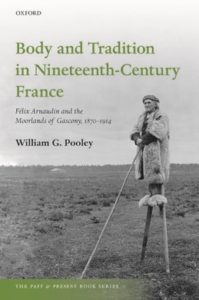The Katharine Briggs Award 2020

We are delighted to announce that the winner of The Katharine Briggs Award 2020 is
William G. Pooley, Body and Tradition in Nineteenth-Century France: Félix Arnaudin and the Moorlands of Gascony, 1870-1914, published by Oxford University Press.
And the runner-up is Jonathan L. READY, Orality, Textuality, and the Homeric Epics: An Interdisciplinary Study of Oral Texts, Dictated Texts, and Wild Texts, also published by Oxford University Press
Report of the Katharine Briggs Award Judges, and their comments on the winner, runner-up and all the shortlisted titles.
One of the purposes of our awards is to encourage the publication and dissemination of material on folklore more widely. Given the additional difficulties posed by the conditions of 2020, we were all the more determined to continue with that encouragement, but we recognise the challenges it presented.
Even the rather stronger book publishing field showed evidence of the pandemic’s impact, and we received roughly half the number of submissions for the Katharine Briggs Award we have seen on average in recent years. It was a pleasure to note, therefore, that the overall quality was high across a diverse range of topics, from charms to paganism, witchcraft to fairy tales, folk plays to the history of folklore researches in many areas, and the shortlist that emerged was representatively strong and broad.
The judges made the following comments about the shortlisted titles, presented here in alphabetical order by author/editor:
Karl BELL (ed), Supernatural Cities: Enchantment, Anxiety and Spectrality (Boydell Press)
This is a provoking and far-reaching interdisciplinary collection exploring cities as haunted and haunting places. The judges particularly noted the exciting register of different voices presented here, with folklorists, historians, literary critics and psychogeographers contributing to an often essential collection.
Deirdre MASK, The Address Book: What Street Addresses Reveal about Identity, Race, Wealth, and Power (Profile Books)
This good piece of popular writing, about a topic that is mostly taken for granted when it comes to the social construction of the modern world, appealed to all of the judges as a book written outside our field that has much of contemporary relevance to say to folklorists. The diversity of its case studies was particularly welcome.
William G. POOLEY, Body and Tradition in Nineteenth-Century France: Félix Arnaudin and the Moorlands of Gascony, 1870-1914 (Oxford University Press)
The author’s thorough and sound scholarship provides a theoretically solidly grounded historical investigation of 19th century French field research and the material collected there. It gives due significance to Félix Arnaudin, and real historical depth to its consideration of folklore. The judges commented variously that it was ‘both scholarly and scandalous’, and ‘one of those books that makes being a judge a pleasure’.
Jonathan L. READY, Orality, Textuality, and the Homeric Epics: An Interdisciplinary Study of Oral Texts, Dictated Texts, and Wild Texts (Oxford University Press)
This dense and technical book far transcends its highly specialised subject area of Homeric oral epic poetry. Its wide comparative reading works both ways: Homerists are introduced to folklore studies, while folklorists have much here to consider about the interaction of collector/transcriber/editor/performer in all oral forms and the mediated relationship between the written and the oral.
Sarah SALIH, Imagining the Pagan in Late Medieval England (D.S. Brewer)
This solid and readable book impressed and convinced the judges with its insistence on the contemporary relevance of its subject. Many of the mediaeval images of the pre-Christian world explored here remain current, giving it both urgency and value in its reflections on the contemporary invention of paganity.
Ilona TUOMI et al (eds), Charms, Charmers and Charming in Ireland: From the Medieval to the Modern (University of Wales Press)
This themed volume provoked much discussion about the scope of edited collections. Despite its apparent narrowness of content, its many valuable chapters probe a wide range of topics across a very broad timeframe.
Pete Jordi WOOD, Queeries: Essays on Queer Theory and Fairy Tales (the author)
All of the judges liked and enjoyed this lovely little book. In particular they appreciated the author’s attempt to get to grips with serious folklore studies in order to understand the queer content of a folktale, a still relatively underexplored field. This book in many ways reflects exactly the sort of intellectual turn and development that the Katharine Briggs Award – and the Folklore Society more generally – exists to encourage.
We congratulate the winner, William G. Pooley, and thank all the authors and publishers who supported The Folklore Society’s Katharine Briggs Award by entering their books into the competition